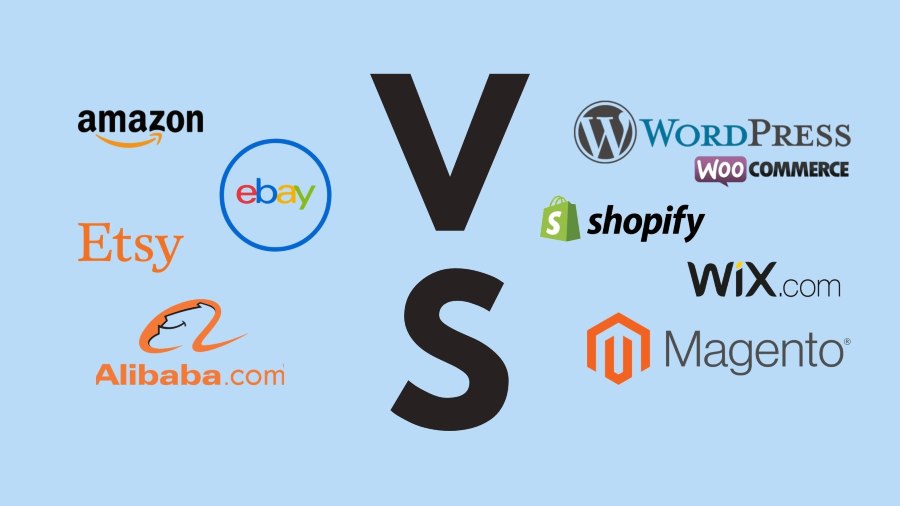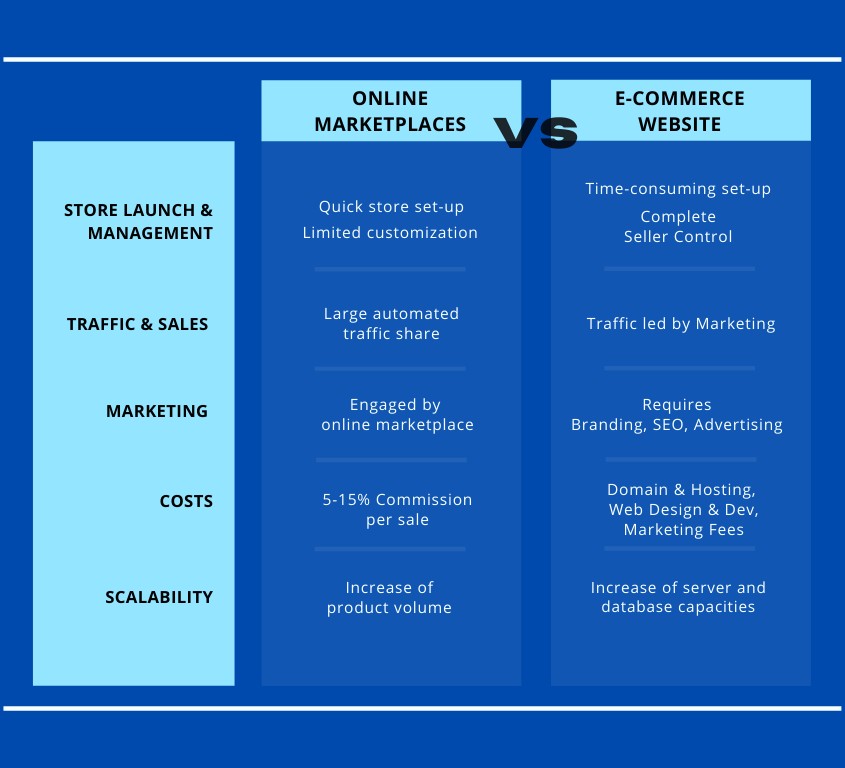
Ecommerce Website VS Online Marketplaces

Ecommerce in 2020 provides a world of retail opportunities from using online marketplace platforms such as Amazon, eBay, Etsy, Alibaba to developing independent websites through Shopify, Woocommerce by Wordpress, Magento, or Wix. Online merchants can go any which way with the infinite options available. But with the recent influx in demand along with the sudden rise of competition, which type of platform is the way to go? More importantly, which among the two will generate you the most sales?
To better understand, we’ll start by settling the main differences. Amazon, eBay, AliExpress, Etsy–these are few examples of top marketplaces in the world as of 2020. Small to medium business owners are the driving force of online marketplaces like these where retailers and shoppers go for fast online transactions. Whereas Ecommerce websites, commonly built with convenient web building tools such as Shopify, WooCommerce, Magento, or Wix, belong to particular businesses or brands that facilitate online transactions by independently driving their own traffic through marketing.
We compared the following 5 elements according to retailer needs to help you navigate through what might be best for your business: store launch to management, traffic and sales, marketing, costs, and scalability.
1. Store Launch and Handling
In any marketplace, launching a store is as easy as setting up a password and filling in basic information. In just a few clicks, a direct transaction can be made from the logistical and technical operations run for you by the platform. Developing an independent website on the other hand, requires some time for customization. You would need to first choose a domain name before getting into the design process, which can be accomplished by the help of ready-to-use templates in Ecommerce softwares like Shopify. A more demanding building process means a more pleasant user experience for your customers than in a marketplace.
Verdict: If you want a quick set-up with just sufficient enough oversight, the marketplace is where your business should be. For less restrictive services and complete control over selling scenarios, consider investing in building a website instead.
2. Traffic & Sales Generation
Your business cannot generate sales without the traffic of potential customers. For online marketplaces, you find your potential customers already at your store. The traffic is drawn by a third-party of different retailers that share the same platform as you. Because the traffic market share is large, so is the competition. If a customer in the marketplace is looking at your products, he/she is looking at similar products listed right by your store too. Conversely, having a separate website gives you a more streamlined target market. This provides opportunities to leave a more lasting impression with competition out of your way. You can freely implement marketing strategies like customer retargeting, site cookies for personalized ads, and more that eventually lead to a sale. The crucial catch here is that public relations for traffic is not just an advantage for an Ecommerce website but a necessity. Without integrating a marketing strategy alongside the launch, there will be no traffic. No traffic means no potential customers.
Verdict: An online marketplace is for you if you want the effortless traffic, but note that the generation of sales depends on the willingness to differentiate your products within the high stakes of low-cost competition.
3. Marketing Schemes
An Ecommerce website gives a unique edge among retailers with the customized layout and distinct domain names. It also provides opportunities to improve Google search rankings (Search Engine Optimization), analyze customer behavior, and conduct relevant marketing activities that overall lead to building customer loyalty. When done right, your marketing budget can turn out to be a worthwhile investment. Consequently, in a marketplace, what you see is what you get. Online traffic to your store is a done deal–engaged by leads brought to you by the marketplace. Absolute reliance on marketplace platforms for traffic and advertising does not leave much room for business branding and dynamic marketing strategies.
Verdict: For stronger brand equity and better customer relationships, venture into building a website and plotting an effective marketing strategy. For automated marketing, marketplace platforms will give you an easy way out.
Read up on How to Promote Your New Website to help you with your Ecommerce shop.

4. Overhead Costs
Setting up your own Ecommerce website will probably be a struggle if your budget is tight. Costs for a website can include and are not limited to advertising expenses, hiring someone for SEO, outsourcing designers and developers, and domain and hosting fees. Even when prices vary and by cutting costs, overall site development and maintenance requires fiscal investment. As for marketplace fees, starting out is less risky. Usually, by the time your store makes its first sale, you’re charged by the marketplace platform. Some platforms charge commissions usually between 5 and 15% per sold item, while others charge either per account membership or per product listing before making a single sale.
Verdict: There is less financial risk when it comes to marketplace sales. Costs that come with selling through an Ecommerce website is viable for businesses foreseeing proprietorship and more long-term profitability.
5. Scalability
Scalability of an online business relies on the ability to meet increasing demands. In order to successfully scale through a marketplace with its fixed commission costs, the store would need to increase product volume just to be profitable. Marketplace retailers do this by hiring virtual assistants to outsource wholesalers of trending products efficiently. Scalability for niche products can be done in Ecommerce websites as long as the focus is on creative marketing and securing your database infrastructure. Investments mostly go to furthering market reach and increasing site database capacities that can accommodate high levels of traffic.
Verdict: Scaling on a marketplace platform or Ecommerce website generally requires a surge in capacity and increase of capital. Opting for an Ecommerce website is best for scaling niche products.
The Hybrid Approach
You always have the option to take advantage of selling in both a marketplace and on a website. This way, you get to enjoy the benefits of receiving traffic from large markets to increasing leads and conversions at your Ecommerce website. Be mindful though - it can quickly become a lot of work to maintain and scale both strategies so make sure you have enough manpower to properly manage both platforms. With enough workforce, then you might be on the right track to generating a significant amount of sales.
Consider first offering your products on popular online marketplaces. If you see that your business is growing and you want to take the next step, then you can eventually develop your brand through an Ecommerce platform. The bigger your business gets, the more it makes sense to have your own website where you have total control of your business every step of the way.
Below we've made a table of the differences between Martketplaces and Ecommerce Website:

Feel free to contact us for a free consultation and quote that can bring you a step closer to your Ecommerce website. We would be happy to work with you and develop the right platform for your business.




